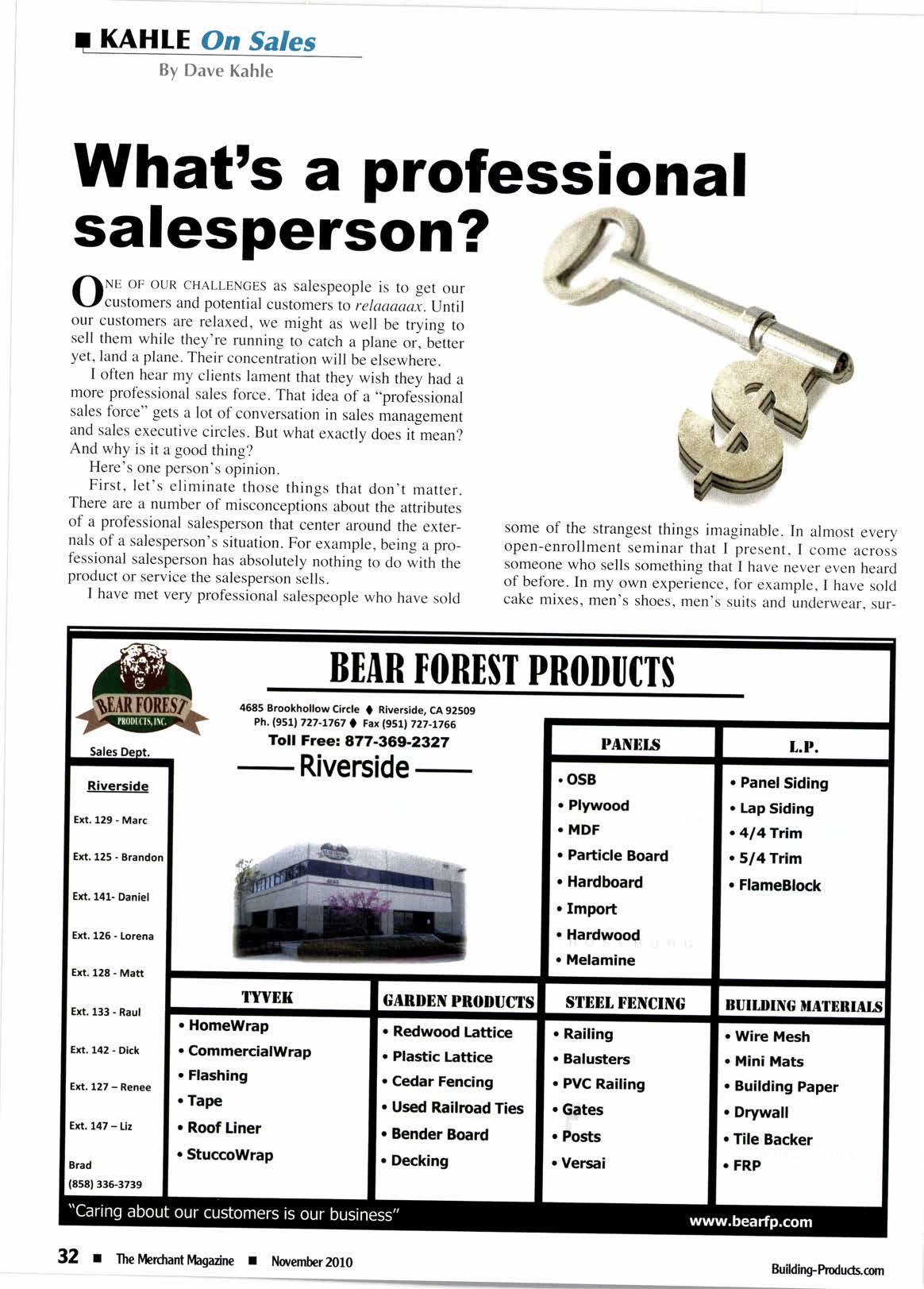
3 minute read
Whatts a professional salesperson?
4"" oF ouR cHALLENGES as salespeople is to ger our
\-, customers and potential customers to relaaaaax. lJntil our customers are relaxed, we might as well be trying to sell them while they're running to catch a plane or, better yet, land a plane. Their concentration will be elsewhere.
I often hear my clients lament that they wish they had a more professional sales force. That idea of a ..professional sales force" gets a lot of conversation in sales management and sales executive circles. But what exactly does it-mean? And why is it a good thing?
Here's one person's opinion.
First, let's eliminate those things that don't matter. There are a number of misconceptions about the attributes of a professional salesperson that center around the exter_ nals of a salesperson's situation. For example, being a pro_ fessional salesperson has absolutely nothing to do with the product or service the salesperson sells.
I have met very professional salespeople who have sold some of th,e strangest things imaginable. In almost every open-enrollment seminar that I present, I come across someone who sells something that I have never even heard of before. In my own experience, for example, I have sold cake mixes, men's shoes, men's suits and underwear. sur_ gical staplers, sophisticated amplification equipment for hearing impaired children, business opportunities, life insurance, catheters, hand soap, and, yes, even salespeople (as a sales recruiter), to name just a few.
Here's another irrelevant external issue: Being a professional salesperson has nothing to do with the folks to whom you sell. There are people in this country who sell something to every single job description and organization imaginable. Some of the customer types to whom my clients have sold include farmers, both crop growers and live stock growers; tool and die shops; tier one, two and three automotive suppliers; schools at every level; government agencies of all kinds; the military; grocery stores, restaurants, convenience stores and retailers of every kind; contractors of every ilk, including electrical, mechanical, HVAC, plumbing; builders both residential and commercial, etc. I could go on and on, but you get the picture. In each and every one of these industries, there are professional salespeople.
Being a professional salesperson has nothing to do with the company for whom the sales person works. There are thousands of independent representatives in this country, for example, who work for themselves. Other sales people work for small family-held businesses, others work for large multi-nationals. Thousands sell for distributors; tens of thousands sell for retailers of every possible thing; more thousands sell for manufacturers and service providers of every type. Professional sales people are sprinkled throughout every one of these business types.
Finally, being a professional salesperson has nothing to do with how long he's been at it, his educational background, or experience level. I have encountered many salespeople who have been selling for over 20 years, for example, who don't come close to fitting into the mold of a professional salesperson. On the other hand, last week, I met a 2l-year-old, in his first sales job, who was very professional.
I have met professional salespeople who had only a high school degree, and many with college and post-graduate degrees. None of these things, which are external to the salesperson's character, matter.
Now that we've eliminated the things that a professional salesperson &rlldingrhoducsom is not, let's look at the other side and examine the marks of a profession salesperson. "Professional" is the name we choose to put on a certain set of character traits and attitudes that reside inside a sales person. l. A professional salesperson is proud to be a salesperson. Can you imagine a doctor who is embarrassed to admit that he is a doctor? Or a nurse who covers up that fact? A teacher who doesn't want anyone to know what he does for a living? A firefighter ashamed to admit it? A lawyer who pretends to be somebody else? (Well, okay, maybe on this one.)
You see, in every profession, the members of that profession are proud to be a part of it. Amazingly, that is not the case with the majority of salespeople. They don't like to think of themselves as salespeople. Instead, they make up other terms. They are account executives, product specialists, customer liaison agents, mobile customer service representatives, to name a few.
On the other hand, the professionals understand the challenging nature of what they do for a living and the









